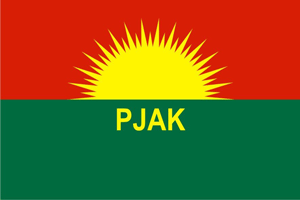 Alan Rebin
Alan Rebin
Hoping to liquidate the Kurdish resistance movement led by the Free Life Party of Kurdistan (PJAK), Iran embarked on a disastrous mission which led to the loss of around 300 Islamic Revolution Guards. This brings the power of Iranian forces under question and gives further credibility and reputation to the Kurdish young organisation, PJAK, which emerged in 2004. The PJAK’s triumph over the Islamic Revolution Guards Corps (IRGC) have already yearned much more support of the Kurdish people in all parts of Kurdistan as well as the Kurdish Diaspora, leading to a massive expansion of the organisation.
On 16th July the Iranian Revolution Guards Corps (IRGC) declared an all-out war against PJAK and despatched thousands of troops equipped with heavy weaponries including tanks, helicopters and missile-launchers to the border region to root out the Kurdish guerrillas. In the Middle East of after Bashar Assad and at the wake of American withdrawal from Iraq, the Iranian authorities needed to display their hegemony in the region. Thus the IRGC’s invasion of South Kurdistan can be regarded as a move to display the hegemony of the Iranian Mullahs in the region, but it was perilously backlashed with the suffering of around 300 Revolution Guards. Although PJAK also lost 8 guerrillas but it can’t be compared to the losing of 300 including 10 generals and senior commanders.
That was a historic mistake on the part of Iranian authority, and not only Iran but all the occupying powers of Kurdistan should take a lesson from it. In fact one of the goals that Iran was pursuing in the invasion of South Kurdistan was to send a message to other occupying powers, particularly Turkey that Iran was still on the side of war against the Kurds and is more than ready to take up militaristic methods. Nevertheless Iran’s embarrassing defeat and its incapacity to achieve one tenth of what she was hoping for, send an opposite message of what Iran was trying to convey. The message was that the Kurds and their resistance movement PJAK, is not the kind of organisation that could ever be liquidated, because it has deep roots firstly in the hearts of the Kurds and secondly in the mountains of Kurdistan. Therefor all the occupying powers of Kurdistan were sent a signal that Kurds and PJAK have become a power in the region and they can’t be underestimated!
What I would like to discuss here is that PJAK had not been engaged in any armed conflict for the last year. In fact PJAK is a political organisation and its main focal point is to organise the masses, educating them to a level where they can lead the revolution and run their own affairs. Nevertheless PJAK holds the right of self-defence once it’s been attacked by the Iranian aggressive Revolution Guards Corps. Based on this line of thought PJAK announced a 7 points declaration of October 2010 calling upon the Iranian authority for a peaceful resolution to the Kurdish issue without restoring to violence. Notwithstanding, the Iranian authorities not only did not respond to PJAK’s call for peace, they took that as a sign of PJAK’s weaknesses and responded militarily. But what was the outcome for the Iranian aggressive state? The disastrous and embarrassing defeat with the suffering of around 300 Islamic Revolution Guards; that was the outcome!
The message behind this defeat is very clear; PJAK has become a power and it can’t be underestimated by any regional or international power. Once PJAK calls for peace and democratic solution to the Kurdish issue, this is not because PJAK is weak; this is because PJAK wants a solution, because Kurds don’t want bloodshed and suffering. The occupying powers of Kurdistan should not miscalculate PJAK’s call for peace and see it as a sign of weakness. If PJAK was a weak movement and had no power to resist Iranian state terrorism, how could one account for the calamitous defeat of Islamic Revolution Guards Corp? What this defeat proves is not only the feebleness inherent in the system of the Iranian military forces but also the high spirited power of Kurdish guerrillas and the ability of PJAK to neutralise any aggression of the occupying powers of Kurdistan.